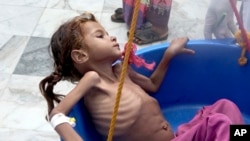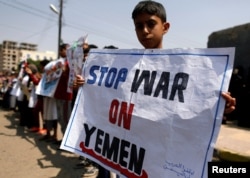U.N. Secretary-General Antonio Guterres said Friday that Yemen is teetering "on a precipice" and called on the international community to stop the violence and prevent a catastrophe.
"The consequences of going on with this war will be terrible for the Yemeni people," Guterres told reporters as he amplified his calls for a cessation of hostilities.
"On the humanitarian side, the situation is desperate," he said, repeating warnings that 14 million Yemenis could be at risk of starvation. "On the political side, there are signs of hope."
Earlier this week, both U.S. Secretary of State Mike Pompeo and U.S. Defense Secretary Jim Mattis called for an end to the nearly four-year conflict. Mattis said the parties should meet in the next 30 days to begin serious negotiations.
Guterres welcomed what he called "strong, constructive engagement" from many U.N. member states in recent days. "I am hopeful that the voice of reason will prevail," he added.
The secretary-general's special envoy for Yemen, Martin Griffiths, in his own statement Wednesday also welcomed the calls and said his office remains committed to bringing the parties to talks within a month. "Dialogue remains the only path to reach an inclusive agreement," Griffiths said.
A Saudi-led coalition began bombing Iranian-backed Houthi rebels in support of Yemen's government in March 2015. Since then, the U.N. estimates more than 10,000 people have been killed, mostly due to airstrikes.
Political efforts to end the crisis have mostly stalled since the Houthis skipped September U.N.-brokered talks in Geneva with the Yemeni government.
The country is suffering from a severe food crisis, that could see half the population slide into famine conditions in coming months.
The food crisis is man-made, in large part due to the collapse of the national economy and the devaluation of the currency. Civil servants and pensioners have not been paid in almost two years, adding to their inability to afford food, especially when the price of many staple items is skyrocketing.
Also driving the humanitarian crisis is the country's reliance on imports of food, fuel and medicine — 90 percent of those goods come from abroad. Clashes around the country's most important sea port — Hodeida — are also hindering food distribution.
The Saudi-led coalition appeared to have launched new strikes against Hodeida port on Friday, according to local media reports. Meanwhile, to the north, the coalition said it hit a rebel-held airbase in the city of Sanaa, used by rebels to launch drone and missile attacks on Saudi territory.





